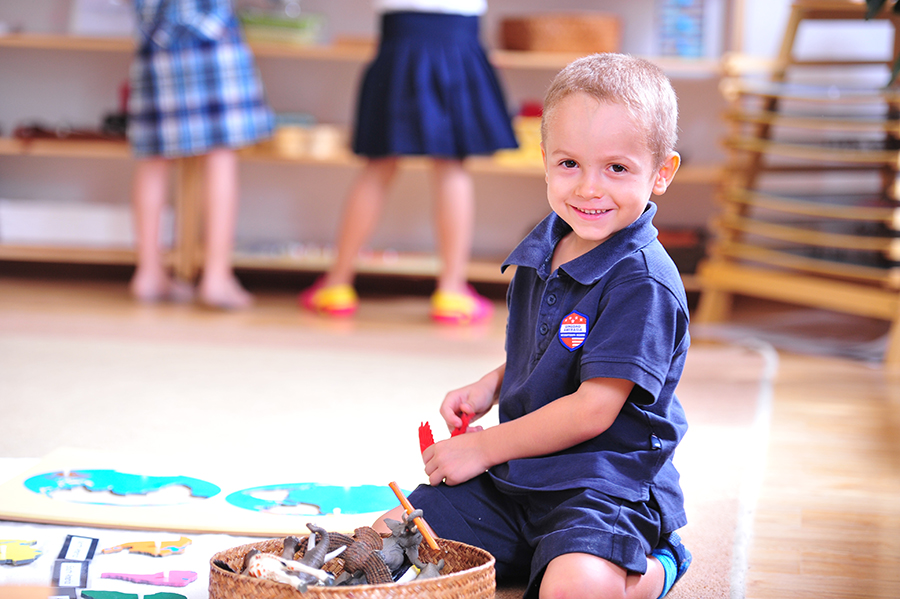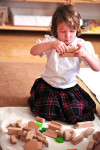
A Great Montessori Day
Helping your child have a great experience transitioning to school
It is normal for children to express reluctance to come to school, especially when they first join our classroom or after any extended break. Some children also experience this after any major change at home, such as the birth of a sibling or a visiting grandparent, even if they previously arrived at school without any problems. This transition can be made easy by talking to your child about school and what to expect. Children feed off of our emotions. Express excitement and trust in your child’s teachers. Talk about how fun it is or how lucky they are to come to such a great school. Be confident that your child will be able to be independent and happy at school. Your confidence, consistency, and positive attitude will help your child overcome this period as quickly and easily as possible.
The night before
Involve your child in the preparation of all the things they need for the next day: backpack, water bottle, uniform, etc.
Talk encouragingly about the plan for the next day: having breakfast and getting ready in the morning, how they will travel to school, who will take them and how they will say goodbye
Have a consistent bedtime ritual and make sure your child goes to sleep early enough to be fully rested in the morning
Morning preparation
Wake up early. Give ample time for the children to do things on their own: eating breakfast, putting on clothes and shoes, etc. Avoid rushing the children as this creates anxiety and resistance
Eat a good breakfast. Eating a breakfast high in protein, whole grains, and fruit gives children the energy for their growing bodies and brains and prepares them for a busy and active morning of learning at school. Try to avoid giving your child sugary breakfast cereals, white-flour pancakes or bread, etc., all of which leave your child hungry and tired half-way through the morning.
Ask your questions. “I wonder what work you will do at school today?” “Share with me later whom you ate snack with.” “Are you going to use the 100 board today?” “I wonder if the turtle will be very active or resting in his tank today.”
Talk with your child about your expectations for arrival at school. “We are going to quietly walk to your classroom and I will give you a kiss and a hug and say goodbye, and then you will put your things in your cubby. Your teacher will be there to greet you and help you start your day…”
Arrival at school or at the bus stop
Be on time. Establishing a consistent routine that you follow every day is vital for children to feel confident and secure. Arriving on time allows your child see all the other children who are arriving confidently and happily at the same time. Children feel anxious if they arrive lat and see that the day has started and children are already working.
Keep goodbyes warm and loving and as brief as possible. Leave with the message that “I will be back at the end of the day”.
Once your child has entered the classroom, let them take care of their things independently. You do not need to wait until you child changes their shoes, etc. – we give them to the time to do it themselves and can help them if necessary.
Once you start to leave please do not come back, even if you hear your child becoming upset. So often we see that children will cry or ask for mom just until mom is out of sight, and then calm themselves and happily enter the classroom themselves! We need you to show your trust in us, so your child will also trust us.
Please do not bring toys from home, as they are distracting and create conflict in our environment.
Do not promise your child candy or treats if they come to school. Treats or bribery encourage children to negotiate and whine for more, and it will escalate, until every day you have to promise a new treat. Instead, speak positively about this experience and help your child work through this emotional transition with confidence and maturity.
At the end of the day
Be on time. Warmly greet your child and express excitement about hearing about their day at school.
Ask loving questions about the child’s day. “Who did you have snack with? What did you play on the playground? What work were you very excited about? Can you tell me about the story you listened to during story time?” Leave time for children’s spontaneous stories and observations and listen carefully to what they have to say. Make them feel they are accepted and loved.
Spend time together. Take a walk in the park, read a book, and play together naturally and warmly. Include your child in the daily activities at home. Preparing food, setting the table, making a grocery list of tomorrow’s dinner, and helping to tidy up the play areas all make a child feel useful and included in the life of the family.













